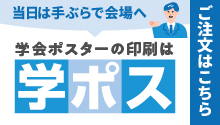Best Presentation Award Winner 2023
JSI gives an award to the superior presenters in the workshop and poster session of the JSI Annual Meeting.
One / Two awardees are selected in an each category by workshop coordinators and chairpersons.
This award is supported by BioLegend and Tomy Digital Biology.
WS01: Infection immunity 1
WS01-02-O/P
Immunosuppression by CXCR2+ MDSC-like cells exacerbates defense responses of the central nervous system after viral infection
Akisawa Satomi (The University of Tokyo)
WS02: Systemic autoimmune diseases
WS02-06-O/P
Identification of a novel age-associated CD4+ T cell subset involved in the pathogenesis of systemic lupus erythematosus
Manaka Goto (The University of Tokyo)
WS03: Macrophages and other innate immune cells in homeostasis
WS03-05-O/P
FoxO1 regulates the number of basophils in the peripheral tissues and basophil-dependent allergic inflammation
Junya Ito (Tokyo Medical and Dental University)
WS04: Innate immunity
WS04-08-O/P
Immune checkpoint molecule Tim3 regulates microglial function and the development of Alzheimer’s disease pathology
Kimitoshi Kimura (Kyoto University)
WS05: Allergy-1
WS05-13-O/P
GATA3 dysfunction in follicular regulatory T cells may underlie selective dysregulation of type 2 humoral immunity in Foxp3A384T mice
Shiki Masumoto (The University of Tokyo)
WS06: Cytokines and chemokines
WS06-15-O/P
IL-18: immune mediator from maternal uterus to placental development
Hajime Ino (Nippon Medical School)
WS07: Tolerance and immune suppression-1
WS07-05-O/P
MHC class II limits microbiota-dependent activation of colonic CD8 T cells in a CD4 T cell- and LAG-3-dependent manner
Tomoya Sengiku (The University of Tokyo)
WS08: Tumor immunity-1; Effector cell therapy
WS08-02-O/P
Trogocytosis controlled CAR-T cells show enhanced anti-tumor activity
Atsutaka Minagawa (Kyoto University)
WS09: Infection immunity 2
WS09-08-O/P
Comprehensive analysis of nasal IgA antibodies induced by intranasal administration of the SARS-CoV-2 spike protein
Nobuyuki Kurosawa (University of Toyama)
WS10: Effector differentiation and function of T cells
WS10-13-O/P
CD47 promotes peripheral T cell survival by preventing dendritic cell–mediated T cell necroptosis
Satomi Komori (Kobe University)
WS11: Cellular basis for the development of pathogenic or tissue-resident macrophages
WS11-05-O/P
EGR2 plays a pivotal role in the differentiation of Ly6Chi monocytes into fibrosis-promoting macrophages
Ayaka Iwata (Tokyo University of Pharmacy and Life Sciences)
WS12: Autoimmunity in arthritis and fibrosis
WS12-20-O/P
TNFα-induced adipose-related protein (TIARP) suppresses the pathogenesis of bleomycin-induced
pulmonary fibrosis
Haruka Miki (University of Tsukuba)
WS13: Tolerance and Immune suppression-2
WS13-01-O/P
Overexpression of BATF enhances proliferative and suppressive activities of Treg cells in vivo
Kohta Matsuura (The University of Tokyo)
WS14: Allergy-2
WS14-08-P/O
Classical monocyte-derived macrophages display high efferocytic ability and contribute to the resolution of basophil-dependent skin allergic inflammation
Kensuke Miyake (Tokyo Medical and Dental University)
WS15: Tumor immunity-2; Various immunotherapy
WS15-06-O/P
A DLL3-targeting trispecific T cell engager with CD3/CD137 dual specific Fabs shows potent antitumor activity in small cell lung cancer models
Ryutaro Iwabuchi (Chugai Pharmaceutical Co., Ltd.)
WS16: Infection immunity 3
WS16-05-O/P
Mycobacterium leprae deactivates a potent PAMP to achieve immune evasion
Shigenari Ishizuka (Osaka University)
WS17: T cell biology in diseases and environments
WS17-8-O/P
Thioredoxin-interacting protein is essential for memory T cell formation via the regulation of the redox metabolism
Kota Kokubo (Chiba University)
WS18: Dendritic cells & Macrophages: development, function and regulation of immune response and disease
WS18-02-O/P
Direct reprogramming of fibroblasts into functional dendritic cells by defined factors
Yutaro Kumagai (National Institute of Advanced Industrial Science and Technology)
WS19: Mucosal-skin immunity 1
WS19-16-O/P
The pyruvate-GPR31 axis promotes transepithelial dendrite formation in human intestinal cDC1
Eri Oguro-Igashira (Osaka University)
WS20: Innate lymphocytes
WS20-07-O/P
Type 1 innate lymphoid cells protect the liver from ischemia-reperfusion injury in mice
Kenshiro Matsuda (University of Tsukuba)
WS21: B cell (1)-from birth to death
WS21-13-O/P
Chronic BCR signaling shapes the generation and maintenance of age-associated B cells from anergic B cells
Keisuke Imabayashi (Kyushu University)
WS22: Tumor immunity-3; Analysis of tumor immunity
WS22-05-O/P
Addressing Tumor Heterogeneity by Sensitizing Resistant Cancer Cells to T cell-secreted Cytokines
Yoshinaga Ito (Kyoto University)
WS23: Organ specific autoimmunity
WS23-18-O/P
Oral bacteria trigger the production of IgA autoantibodies in IgA nephropathy model mice
Mizuki Higashiyama (Tokyo University of Science)
WS24: T cell development and function
WS24-24-O/P
Unique structural basis of the recognition of bulky mycobacterial glycolipid by a novel CD1-restricted TCR
Minori Asa (Osaka University)
WS25: Mucosal-skin immunity2
WS25-05-O/P
Deubiquitinase OTUD3 prevents progression of ulcerative colitis by modulating microbiota-mediated STING activation in intestinal fibroblasts
Bo Li (Osaka University)
WS26: Human immunology and immunogenetics
WS26-11-O/P
Quantification of the escape from X chromosome inactivation with the million cell-scale human blood single-cell RNA-seq datasets reveals heterogeneity of escape across immune cells
Yoshihiko Tomofuji (Osaka University)
WS27: Hematopoiesis and immune environment
WS27-13-O/P
DNAM-1 immunoreceptor protects mice from concanavalin A-induced acute liver injury by reducing neutrophil infiltration
Soichi Matsuo (University of Tsukuba)
WS28: B cell (2)- fight against infectious diseases
WS28-14-O/P
Repeated exposure to SARS-CoV-2 Omicron antigens alleviates immunological imprinting and develops Omicron-specific B cells with phenotypically distinctive features
Ryutaro Kotaki (National Institute of Infectious Diseases)



